 Picture this: a 3-year-old child learning the difference between big and small objects via online class, without having any access to physical objects.
Picture this: a 3-year-old child learning the difference between big and small objects via online class, without having any access to physical objects.
Preschool online classes for kids india for 3 year olds seems like a tough job, don’t you think?
Today, there is no other source of play and learning for children less than 6 years of age. While partial normalcy has been restored for the K12 segment as children learn via online courses, preschool children have been forced to face the brunt with zero normalcy.
With preschools closed and education moving to online class for toddlers and kg students, they are spending an excessive amount of time in front of the screen. This “new normal” is neither recommended nor viable for the physical and mental health of kids in this fragile age group.
Here’s why…
In the first few years, your child’s brain grows trillions of brain-cell connections called synapses, which determine their development.
The more brain cells your child grows and retains in the early years, the more successful they will become.
But here’s the catch: they either use it or lose it.
Yes, synapses that are not used will get eliminated causing lesser neural connections. This is why your child needs rich early experiences during the first few years, to retain the synapses.
An overexposure to mobile phones and screens stunts their creative growth.
RELATED: Is it fair to put preschoolers through online education?
Why pure online education isn’t recommended for children less than 6 years of age
With the rise in free online nursery classes for kids, it is important for parents to understand, the consequences these pure free online courses for kids can have.
-
Impact on brain development:
Did you know, 80% of a child’s brain develops before the age of 6?
This is the stage when they need to move around, explore ask questions, gain experiences, involve their senses, and so on. At this vital stage, prolonged online classes for nursery activity classes for kids will only cause harm in the long run by affecting their cognitive brain development.
-
Impact on physiological growth:
Nursery online classes for kids, force them to sit in one place and stare at the screen. This lifestyle can lead to obesity due to a lack of physical exercise.
Additionally, the blue light emitted from screens, before bedtime, tricks the brain into thinking it’s daytime, causing a negative influence on their sleep cycle.
Not just that, the light from the screens cause irritation and dry eyes, also leading to headache in the long run.
It cannot be ignored that, with the overuse of screens mixed with lack of physical activity, due to online classes for kindergarten children may get neck pain, bad posture, protruding neck, etc.
-
Impact on behaviour:
During the online class for preschool, with excess screens, children become passive viewers rather than actively interacting as they would with teachers and classmates otherwise.
Child expert Vidya Ragu explains that when a visual is stimulating, the scene flashes again and again in the child’s mind – and lasts for a longer impact.
Subsequently, a child’s creativity gets diminished as the child spends most of the time in front of the screen, due to the nature of online classes for children.
Online school is also very likely to make kids irritable and angry.
Children who spend too much time with screens during the years of development will find it very hard to deal with, establish and maintain relationships.
-
Low attention span:
There are many distractors in live online learning for kids. It is important to break down the lessons taught in the online classes for nursery students especially, for nursery students, as they have limited attention span.
Here’s what preschoolers need
-
Multi-sensory experiences:
 Children use all their senses to touch, feel, experience every toy or activity — be it sand, vessels, boxes, clay — that they come in contact with. They need hands-on exposure to strengthen their skills and learning. With online courses, the kids will completely miss out on this essential experience. Since children are encouraged to use their senses while learning, it improves holistic development.
Children use all their senses to touch, feel, experience every toy or activity — be it sand, vessels, boxes, clay — that they come in contact with. They need hands-on exposure to strengthen their skills and learning. With online courses, the kids will completely miss out on this essential experience. Since children are encouraged to use their senses while learning, it improves holistic development.
-
Activity-based learning
When children learn by engaging with activities, they are provided with the necessary stimuli required for imparting learning. The hands-on material helps create a connection to what the children are being taught.
Activity-based learning provides parents with the flexibility to revisit the learning goals.
-
Unstructured play
Children learn primarily through play. According to the American Academy of Pediatrics, without open-ended child-led play, children miss out on crucial learning experiences, such as task persistence, impulse control, emotion regulation, and creative thinking.
-
Independent or self-initiated learning
Self-initiated, independent learning is encouraged for children. This helps them develop their creativity and thinking skills.
Independent learning cultivates skills that stay with children for the rest of their lives.
When children participate in independent learning, they are introduced to decision-making and taking small responsibilities.
Taking responsibility for their own learning and correcting their own mistakes gives children problem-solving skills that lead to higher self-esteem.
-
Fine and gross motor exploration
Preschool curriculums focus on enhancing a child’s fine motor and gross motor movements. Running around may be an everyday event, but how about balancing or perhaps, stretching? 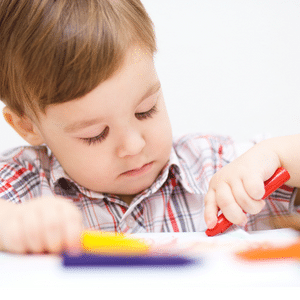
Imagine your child moving around while singing a rhyme!
Moreover, this is the age, children are introduced to writing!
Well, for this to happen, they require a tripod grip — use of the thumb, index, and middle fingers to hold a writing tool such as pencil, crayons, etc.
Hands-on activities — such as finger-painting, peeling and pasting; etc. — enable their natural grip transition as they provide suitable tools for improvement.
-
Learning modified for individual needs
Every child learns differently. Some learn through listening and hearing; some learn through seeing visually; some learn through doing. It cannot be expected that all children learn the same way, by sitting in front of the screen and learning visually. Online learning negates the individual requirements and styles of learning that young children have.
Blended Learning – The way forward
During a time like this, when going to a physical school is not a possibility, parents can opt for Blended Learning — a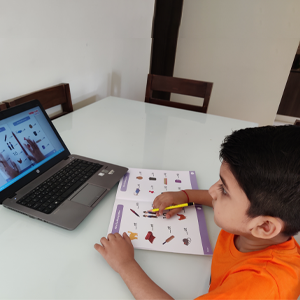 form of learning that combines the best of hands-on and online experiences!
form of learning that combines the best of hands-on and online experiences!
This form of learning is interactive in every sense of the word.
Children not only get a chance to interact in the physical world through hands-on activities, but they also get the opportunity to interact with the digital sphere through online sessions.
Since blended learning includes hands-on exploration and structured virtual classes, this also limits the child’s screen time to an optimal level.
If you’re looking for a blended learning program for your child, we have the perfect solution!
Introducing Flintoclass@HOME – India’s No.1 blended learning program delivered home!
Flintoclass is a research-backed learning program that provides hands-on activities and pre-recorded guidance sessions to children between the ages of 1.5 and 6 years.
All the materials are shipped directly to your doorstep, so your child can learn from the safety of your home!
Designed by Pedagogy experts and child psychologists, the curriculum supports holistic learning for children.
The curriculum focuses on communication & language skills, physical development, social and emotional development, creative skills, cognitive development, and literacy skills.
Flintoclass@HOME kit provides a variety of sensorial materials that help in the cognitive development of children. The hands-on materials provided in the kit are attractive and play-based, making the learning fun and meaningful!
The best part is, the pre-recorded sessions give the flexibility to pursue the learning according to the convenience of the parent and child. It is the ideal option for the best online classes for kids!
Watch this video to find out why doctors, educators, and parents around the world love and recommend Flintoclass@HOME!




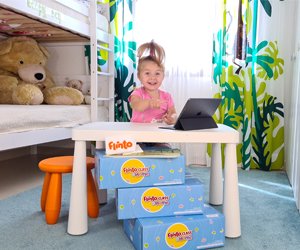
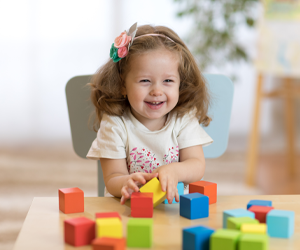
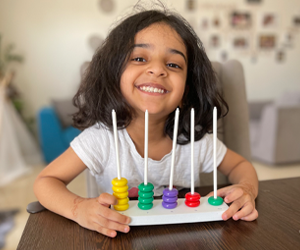
Manjula Dilip Adappa
Appears to be a well planned, effective pre-schooling programme…. Just what children at this tender age need to get them started in life….. in a fun, relaxed way……..
K. Karthik
Great thought process